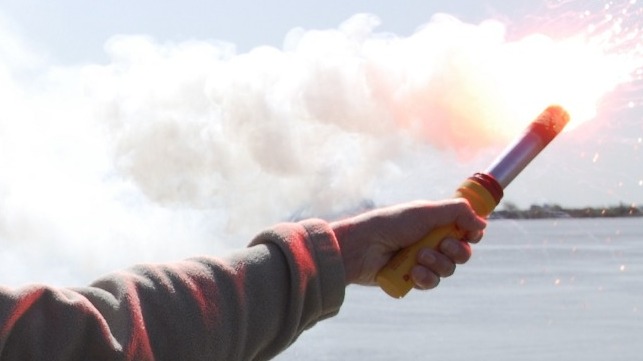USCG: Needless Flares and Drunk Boating Still Illegal on 4th of July

In a message repeated every Fourth of July weekend, the U.S. Coast Guard has reminded boaters and vessel operators not to use distress flares as celebratory fireworks - an act that could potentially result in a felony charge and stiff penalties, up to and including prison time.
Flares are an internationally-recognized distress signal and are designed to draw attention to an emergency situation. Lighting flares from vessels will activate a response from the USCG, which may pull resources away from those in actual distress.
”Every Fourth of July, Coast Guard personnel receive and respond to numerous false flare sighting reports,” said Lt. Cmdr. Lisa Hatland, District 17 command center chief. “It can be quite challenging to distinguish emergencies from those celebrating, and each report requires considerable man-power to determine exactly where the flare originated and whether or not someone needs help there. With the increase of maritime traffic over the weekend, actual maritime emergencies are highly probable. Firing a flare in a non-emergency situation could result in delayed Coast Guard response to a legitimate maritime emergency in a different location.”
It is a federal felony for anyone to intentionally communicate a false distress message to the Coast Guard or cause the Coast Guard to attempt to save lives and property when no help is needed. This includes firing flares in a non-distress situation or using the word “mayday" for a radio check.

that matters most
Get the latest maritime news delivered to your inbox daily.
This felony offense is punishable by up to ten years in prison, a criminal fine of up to $250,000, a civil fine of up to $10,000, and reimbursement to the Coast Guard for the cost of any search effort resulting from the false signal.
The USCG is also posting a nationwide lookout for drunk boaters. Its annual "Operation Dry Water" is a campaign over the Fourth of July weekend targeting boaters operating under the influence. In 2019, alcohol continued to be the leading known contributing factor in fatal boating accidents in the U.S., accounting for more than 100 deaths (23 percent of all fatalities).
“With Operation Dry Water coming up, our primary mission is to emphasize boating safety and to raise awareness of the dangers of drinking alcohol while operating a boat,” said Lt. Cmdr. Ellen Motoi, the Coast Guard Sector San Diego chief of enforcement. “Boating under the influence is just as dangerous as drinking while driving and the Coast Guard takes it very seriously. If you’re going to be operating a vessel, we recommend that you don’t drink. If you exceed the .08 [percent] limit you could be facing potential serious consequences.”
